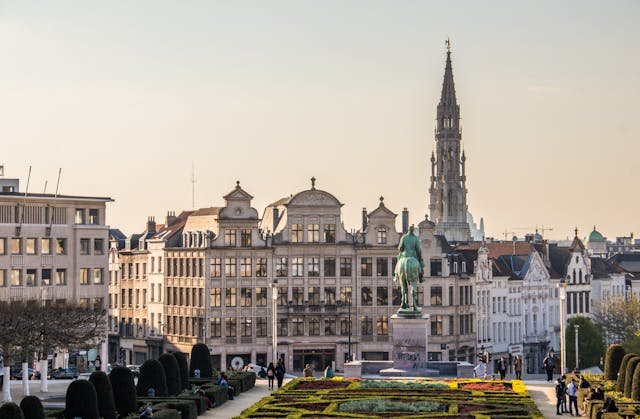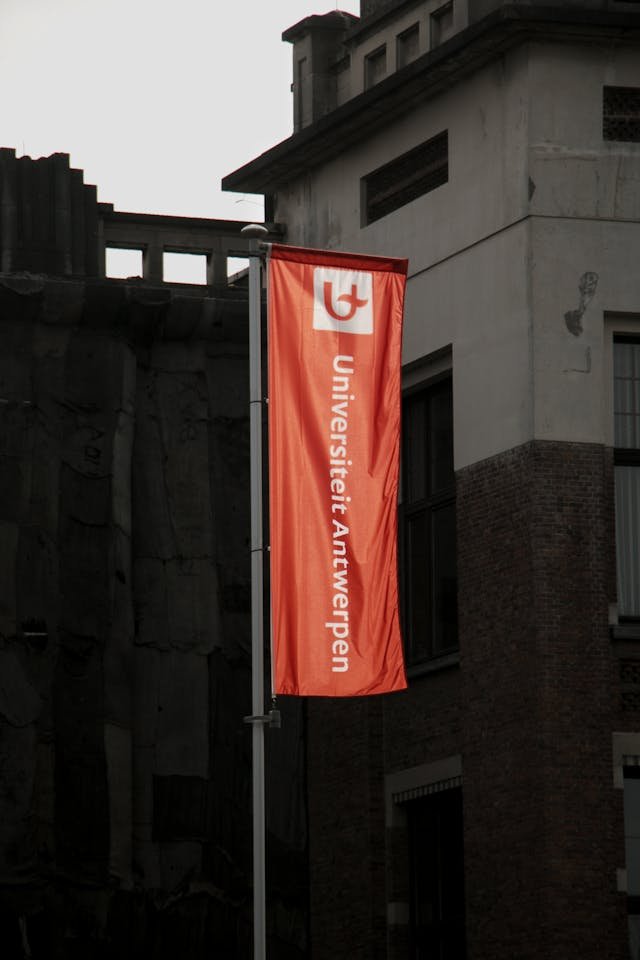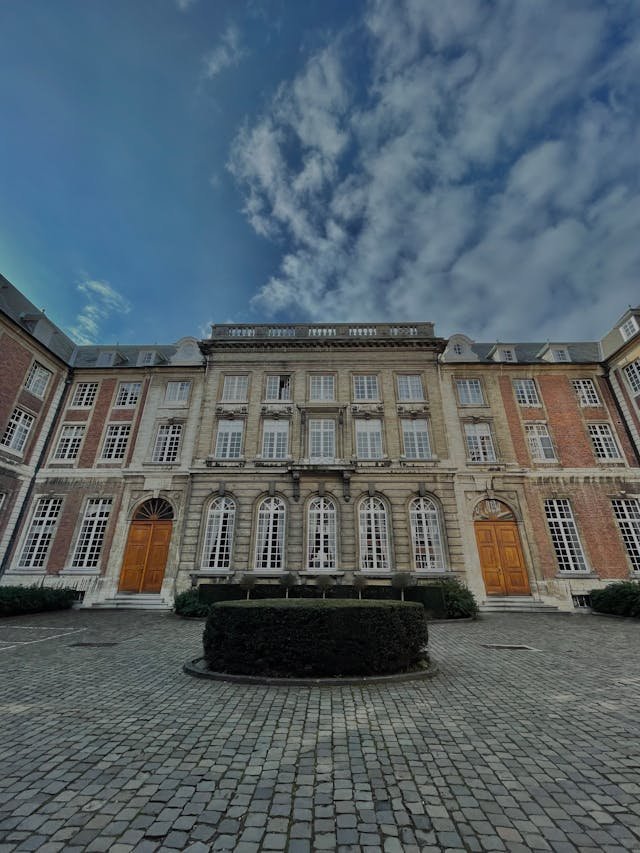
Study in Belgium with Expert Student Visa Consultancy
Belgium may be a small country, but it offers a world-class education system, rich cultural diversity, and strong international connections. Known as the hub of European diplomacy, Belgium is home to many global organizations, making it an ideal place for students looking for international exposure.
Why Choose Belgium for Your Studies?
Belgium is a top choice for international students due to its exceptional education system, globally recognized universities, and diverse cultural environment. The country offers excellent opportunities for international networking, making it an ideal destination for students aiming to build a global career.
Brussels, the capital of Belgium, is a major hub for European politics and global business. Its central location offers easy access to major cities like Paris, Amsterdam, London, and Berlin, making it a strategic choice for students interested in international internships and business studies. Belgium’s multilingual environment, with Dutch, French, and German as official languages, ensures that students can adapt easily. Additionally, English is widely spoken, especially in Brussels, eliminating language barriers for international students.
Beyond academics, Belgium’s rich history, stunning architecture, and delicious cuisine—including world-famous waffles and chocolates—make studying here a truly unique and enriching experience.
Top-Ranked Universities
Institutions like KU Leuven, Ghent University, and Université Libre de Bruxelles offer high-quality education with strong academic research and innovation.Multilingual & Multicultural Experience
As a trilingual country (French, Dutch, and German) with a growing number of English-taught programs, Belgium provides a diverse and inclusive learning environment.Affordable Education
Compared to other Western European countries, tuition fees in Belgium are more budget-friendly, making it a great option for international students.Strategic Location
Studying in Belgium gives students access to leading global institutions, multinational companies, and internship opportunities in cities like Brussels, which is home to the European Union headquarters and major international organizations.Exciting Student Life
From exploring historic cities like Brussels, Bruges, and Antwerp to attending international festivals and cultural events, Belgium offers an enriching student experience beyond the classroom.Post-Study Work & Career Prospects
Graduates can apply for work visas and build their careers in Belgium, a country known for its strong economy, innovation-driven industries, and work-life balance.Key Highlights of Studying in Belgium


Frequently Asked Questions – Study in Belgium
What are the language requirements for studying in Belgium?
What is the cost of living in Belgium for international students?
What are the documents required to apply for a student visa to Belgium?
Can international students work part-time while studying in Belgium?
What are the housing options available for international students in Belgium?
How can international students integrate into Belgian culture and meet local students?
What is the job market like for international students in Belgium after graduation?
Are scholarships available for international students in Belgium?
Do students need IELTS or TOEFL to study in Belgium?
Are there opportunities for international students to participate in research projects or internships?
Can I bring my family while studying in Belgium?
What are the best universities in Belgium for international students?
How long does it take to process a Belgium student visa?
What is the healthcare system like for international students in Belgium?
What are the advantages of studying in Belgium compared to other European countries?
Which Are the Best Universities in Belgium?
Belgium is home to several world-renowned universities that offer high-quality education, strong research facilities, and global recognition. Below is a list of the top-ranked universities in Belgium, based on international university rankings:

Katholieke Universiteit Leuven (KU Leuven)
University of Ghent
Université Catholique de Louvain (UCL)
Vrije Universiteit Brussel (VUB)
Université Libre de Bruxelles (ULB)
University of Antwerp
University of Liège
University of Hasselt
How Does the Education System in Belgium Work?
Belgium’s higher education system is structured and regulated by its three linguistic communities:
- Flemish Community (Dutch-speaking)
- French Community (French-speaking)
- German-speaking Community
Although education is managed independently by each community, the overall system follows the Bologna Process, ensuring that degrees awarded in Belgium are recognized across Europe.
Types of Higher Education Institutions in Belgium
Belgium has several types of higher education institutions that cater to students from around the world. These include:
- Universities – Offer research-based Bachelor’s, Master’s, and Doctorate programs.
- University Colleges (Hautes Écoles in the French Community) – Provide professional training and applied sciences programs.
- Institutes of Architecture – Specialize in architecture and urban planning (only in the French Community).
- Art Colleges (Écoles Supérieures des Arts) – Offer programs in visual and performing arts (only in the French Community).
- Royal Military Academy – Provides military training and education in defense and security studies.
Study Programs and Languages
Students can pursue their education in Dutch, French, or German, depending on the university and community. Many universities also offer English-taught programs at the Master’s and Doctorate levels, making Belgium an attractive study destination for international students.
By studying in Belgium, students gain access to a world-class education system, multicultural exposure, and degrees recognized across Europe and beyond.
What Are the Career Opportunities for International Students in Belgium?
Belgium’s economy presents a wealth of career opportunities for international students, making it an attractive destination for those looking to build a strong professional foundation.
Key Industries and Job Prospects
- Pharmaceuticals & Biotechnology – Home to global pharmaceutical companies, Belgium offers research-driven careers in drug development, clinical trials, and biotech innovation.
- Information Technology & Cybersecurity – With the rise of digitalization, IT professionals, software developers, and cybersecurity experts are in high demand.
- Engineering & Manufacturing – Belgium’s manufacturing sector provides opportunities in mechanical, electrical, and chemical engineering, particularly in Antwerp’s industrial hubs.
- Finance & Banking – Brussels, being a financial hub, attracts professionals in banking, investment, and fintech.
- Sustainability & Renewable Energy – The country’s commitment to green technology drives careers in environmental science, renewable energy, and smart city development.
- Logistics & Supply Chain Management – Belgium’s strategic location in Europe makes it a center for global trade, offering career opportunities in transportation and logistics.
- International Business & Trade – With its multilingual workforce and proximity to the European Union, Belgium is an ideal place for careers in international relations, marketing, and global business management.
Work Opportunities for International Students
- Students in Belgium can work 20 hours per week during academic sessions and full-time during holidays, provided their job does not interfere with studies.
- After graduation, international students can apply for a post-study work permit, allowing them to seek employment in Belgium or other EU nations.
With its high standard of living, multilingual work environment, and strong job market, Belgium offers international students a solid career foundation in Europe.

What is Student Life Like in Belgium?
Studying in Belgium offers international students a rich cultural experience, high quality of life, and easy access to the rest of Europe. Whether you enjoy vibrant city life, historic architecture, or peaceful countryside, Belgium has something for everyone.

Multicultural Atmosphere
- As the heart of Europe, Belgium is home to a diverse mix of cultures, with international students from across the world.
- English is widely spoken, alongside Dutch, French, and German, making it easy for students to adapt.
Affordable and High-Quality Living
- Student-friendly cities like Brussels, Antwerp, and Ghent offer affordable accommodation, efficient public transport, and top-class healthcare.
- The country boasts high safety standards, ensuring a comfortable and secure environment for students.
Travel and Leisure Opportunities
- Belgium’s central location in Europe allows for easy weekend trips to cities like Paris, Amsterdam, Berlin, and London.
- From the famous Belgian waffles and chocolates to the rich history of medieval towns, there’s always something new to explore.
- Festivals, music events, and art exhibitions make student life exciting and engaging.
Work-Life Balance
- Students can work part-time to support their expenses while gaining international work experience.
- Post-study, Belgium offers internships and career opportunities across various industries.
What Tests Are Required for Admission to Belgian Universities?
Belgian universities do not require standardized entrance exams like GRE or GMAT for admission into most programs. However, international students must meet language proficiency requirements based on the language of instruction in their chosen program.
Language Proficiency Requirements
Applicants must demonstrate proficiency in the language of instruction for their program:
- Dutch, French, or German Proficiency Tests: Required for programs taught in Belgium’s official languages. Each university conducts its own language admission tests to ensure students can successfully complete the course.
- English Proficiency Tests: For programs taught in English, students whose native language is not English must provide proof of proficiency through standardized tests such as:
- IELTS – Minimum score: 6.0
- TOEFL (Paper-Based) – Minimum score: 550
- TOEFL (Computer-Based) – Minimum score: 213
- TOEFL (Internet-Based) – Minimum score: 79-80
Educational Qualifications
- Students must have successfully completed upper secondary studies in a country that is a signatory of the Lisbon Recognition Convention or have a valid school leaving certificate recognized by Belgian authorities.
- Some specific programs, such as medicine, engineering, or business, may have additional academic requirements or admission tests.
Each university has its own admission process, so it is advisable for students to check the specific entry requirements for their chosen institution before applying.
How Much Does It Cost to Study in Belgium?
Belgium offers affordable tuition fees and a reasonable cost of living, making it an attractive destination for international students. While tuition costs vary by university and program, Belgium remains one of the more budget-friendly study options in Europe.
Tuition Fees for International Students
- Public Universities: Tuition fees start from €900 per year.
- Non-EU Students: Additional fees may apply, ranging from €2,000 to €4,000 per year, depending on the institution and field of study.
- Private Institutions: Fees are generally higher and vary by university.
Living Costs in Belgium
The cost of living in Belgium depends on factors such as accommodation, food, transport, and entertainment. On average:
- Brussels (Capital City): €870 – €1,050 per month
- Other Cities (e.g., Bruges, Ghent, Leuven): €720 – €820 per month
Breakdown of Monthly Expenses
| Expense Type | Estimated Cost (€) |
|---|---|
| Accommodation | €350 – €600 |
| Food | €200 – €400 |
| Transportation | €50 – €100 |
| Health Insurance | €20 – €50 |
| Leisure & Miscellaneous | €100 – €250 |
Belgium also provides student discounts on recreational activities, public transport, and cultural events, helping students reduce overall expenses.
How to Apply for a Study Visa in Belgium?
International students can apply for two intakes in Belgium:
- Fall Semester (October Start)
- Spring Semester (February Start)
Follow these essential steps to ensure a smooth application process:
Step-by-Step Application Process
Select a University & Program
- Research universities and courses that match your academic and career goals.
Obtain the Application Form
- Visit the official university website or contact the admissions office via email, phone, or their foreign recruitment offices.
Complete the Application Form
- Ensure all details are accurate. Check specific requirements such as eligibility criteria, deadlines, and required documents.
Meet the Admission Requirements
- Prepare for any required standardized tests such as IELTS, TOEFL, or PTE.
Submit Required Documents
- Academic transcripts and certificates
- Proof of sufficient financial funds (bank statements)
- English or other language proficiency test scores
- Overseas student health insurance proof
Receive an Acceptance Letter
- If selected, the university will send an official acceptance letter via email.
Pay Initial Deposit
- Secure your admission by paying the required tuition fee deposit before the deadline.
Apply for a Belgium Student Visa
- Submit your student visa application with supporting documents.
Prepare for Travel & Arrival
- Arrange accommodation, book flights, and attend the university orientation.
Belgium’s application process may vary by institution, so always check the official university website for specific guidelines.
What Are the Benefits of Studying in Belgium?
Belgium is a top choice for international students due to its high-quality education, affordable living costs, and multicultural environment. Here are some key benefits of studying in Belgium:
Access to Scholarships
- Both private and government-funded scholarships are available for international students, reducing financial burden.
Easy Travel Across Europe
- Belgium’s central location makes it easy to travel to France, Germany, the Netherlands, and other EU countries within a few hours.
Affordable Living Costs
- Compared to other Western European countries, Belgium offers reasonably priced accommodation, food, and transportation.
Study in a Globally Recognized Education
- Belgium is home to some of Europe’s oldest and most prestigious universities known for research and academic excellence.
English-Taught Programs
- Many universities offer English-language courses, while students also get the opportunity to practice French, Dutch, or German, improving language skills.
Work While Studying
- Students can work part-time while studying, helping them gain experience and cover living expenses.
Well-Connected Public Transport
- The country has a highly developed transport network, making daily commutes convenient and affordable for students.
Multicultural & International Environment
- With students from over 100 nationalities, Belgium offers diverse cultural experiences and networking opportunities with professionals from various industries.
